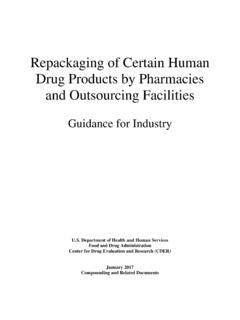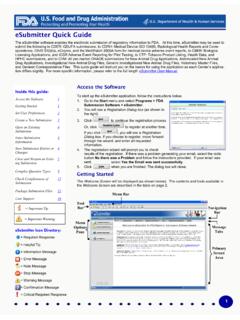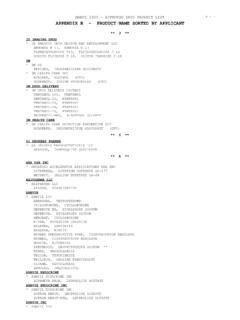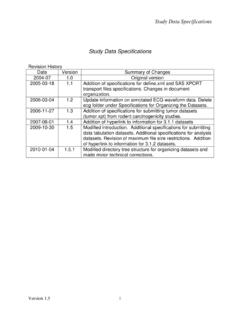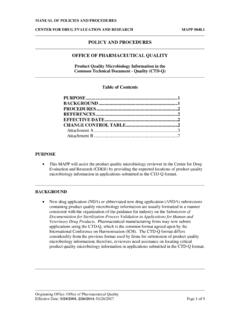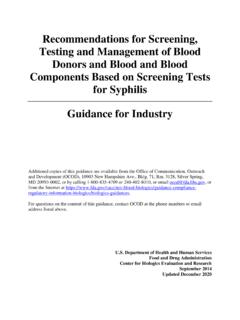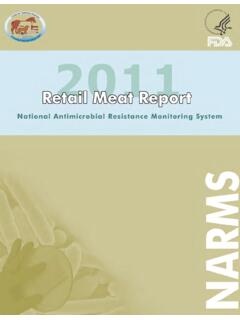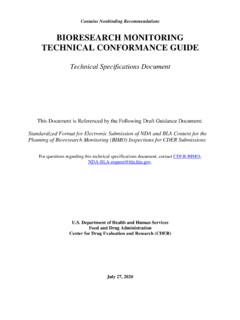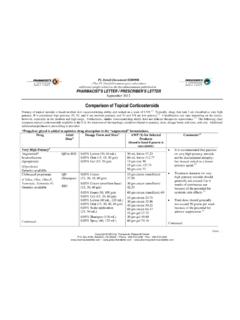Transcription of Topical Dermatological Generic Drug Products: …
1 Topical Dermatological Generic drug Products: Overcoming Barriers and Improving Patient Access to Topical Dermatological Drugs Markham C. Luke, MD, PhD, FAAD Director, Division of Therapeutic Performance (DTP), Office of Research and Standards, OGD, CDER, FDA 1 GDUFA Complex Products Workshops Oct 6th, 2017: Demonstrating Equivalence of Generic Complex drug Substances and Formulations Oct 20th, 2017: Topical Dermatological Generic drug Products: Overcoming Barriers to Development and Improving Patient Access Jan 9th, 2018: New Insights for product Development and Bioequivalence Assessments of Generic Orally Inhaled and Nasal drug Products 2 Complex Products Under GDUFA II Complex active ingredients Complex mixtures of APIs, polymeric compounds, peptides Complex formulations Liposomes, suspensions, emulsions, gels Complex routes of delivery Locally acting such as Dermatological and inhalational drugs Complex dosage forms Long acting injectables and implantables, transdermals.
2 MDIs Complex drug -device combinations 3 Scope of this Workshop Complex active ingredients Complex mixtures of APIs, polymeric compounds, peptides Complex formulations Liposomes, suspensions, emulsions, gels Complex routes of delivery Locally acting such as Dermatological and inhalational drugs Complex dosage forms Long acting injectables and implantables, transdermals, MDIs Complex drug -device combinations 4 Today s Agenda 8:00 AM Opening Remarks Dr. Peters, Dr. Luke 8:40 AM Dr. Sinner, Dr. Roberts, AM Break then Dr. Murthy, Dr. Stinchcomb 11:40 AM Lunch 12:40 PM Prepared Public Comments Multiple Speakers 1:45 PM Dr.
3 Raney, Dr. Simamora, Dr. Dandamudi 3:30 PM Panel Discussion and Open Public Comment 4:00 PM Dr. Maibach, Dr. Lionberger - Closing Remarks 4:30 PM Anticipated Finish 5 6 Skin Ointments, Creams, and Lotions 7 Dermatologic Disease Most patients with Dermatologic Disease: Common Chronic Costly Topical drugs are an important part of therapy for Dermatologic Disease Generic Topical drugs may help lower costs and increase drug accessibility for patients. 8 Herpes simplex 1 (Cold sores) 9 Psoriasis 10 Acne vulgaris 11 Rosacea 12 Topical Dermatologic Drugs Topical Dermatologic Drugs make up a large percentage of products without Generic drug equivalents on the market in the United States.
4 These products require specialized manufacturing, large scale mixing and heating, precise volume filling, and packaging. With few competitors, this can lead to monopolistic marketplace behavior. 13 Impact on Dermatology Dermatologists and patients with skin diseases have noted price spikes in products that they use. This can result in lack of access to needed medication and poor health outcomes. 14 Barriers Obstacles that prevent movement or access Circumstances or materials that keep things apart or prevent communication or progress 15 Barriers to Topical Generic Drugs drug products have generally had difficult-to-conduct clinical BE studies as a hurdle to Generic development.
5 Systemic PK does not always represent site of action to product complexity, formulations having the same quantitative and qualitative composition may result in different appearing, functioning products. 16 1. Bioequivalence Bioequivalence is the absence of a significant difference in the rate and extent to which the active ingredient or active moiety in pharmaceutical equivalents or pharmaceutical alternatives becomes available at the site of drug action when administered at the same molar dose under similar conditions in an appropriately designed study .. 21 CFR 17 In vivo Clinical BE Study Option Bioequivalence may be demonstrated via a Clinical Endpoint BE study.
6 Usually Test vs. Reference vs. Vehicle Not sensitive if clinical dose is on the flat part of the dose response curve. Resource intensive - May require: many subjects multiple visits to assess the severity of skin lesions physician assessments 8 or 12 week study with individual patients (not cross-over) vs. 1-2 day single dose cross-over BE study. 18 Some Alternative BE Approaches for Topical Dermatologic Drugs Modified Stoughton-McKenzie cutaneous vascular blanching test for glucocorticoids Topical Solutions same concentration of active drug ingredient assuming the formulation does not impact bioavailability of the active in the test vs.
7 Reference. Inclusion of non-matching, penetration enhancing excipients in test formulations are discouraged. 19 20 32 2. Q1, Q2, and Q3 Definitions Q1: Same components Qualitative sameness Q2: Same components in same concentration Quantitative sameness Q3: Same physical and structure qualities that define a product Q3 is an in vitro characterization-based determination Look and feel can affect how the product sticks to diseased skin Physicochemical differences usually come from manufacturing processes or excipient sourcing if Q1 and Q2 attributes are the same Q Sameness/Similarity Q1 qualitative Same active, same excipients Q2 quantitative Same amounts Q3 - Similar physicochemistry drug Formulations 21 Generic Q Hypotheses Even if a Topical product (usually a semi-solid)
8 Is Q1 and Q2 the same, it can have sufficiently different physicochemical attributes to be noticeable in the clinical context (look and feel) and affect product performance. If a test product is Q3 the same as a reference product , it is likely considered to be bioequivalent (greater confidence in inferring BE) 22 Recently Released or Revised product Specific Guidances FDA s latest thinking on Topical product bioequivalence is reflected in published product Specific Guidances. Examples: Acyclovir Topical Cream revised December 2016 Silver Sulfadiazine Topical Cream July 2017 Dapsone Topical Gel October 2017 Docosanol Topical Cream October 2017 Ivermectin Topical Cream October 2017 23 See FDA website under product Specific Guidances for Generic drug Development 24 Conclusions Historically, there have been relatively fewer Generic products for dermatologic drug products we aim to change this thru good science and regulatory pathways.
9 New technologies are available to provide new valid and reproducible approaches for Topical Generic product equivalence reducing the barrier for new Generic drug development. In vitro only pathway that encompasses Q1, Q2, and Q3 sameness is now available to Topical dermatologic Generic drug developers. Future Direction Q1, Q2, and Q3 may not sustain the needed competition in the Topical dermatologic products arena once legacy products have generics. BE standards and methods need to be considered for prospective non-Q1/Q2 products that have similar physicochemical properties.
10 You are asked to contemplate and propose innovative approaches to demonstrate BE for Topical Dermatological Generic products. 25 26 Vision Statement No patient should be priced out of the medicines they need, and as an agency dedicated to promoting public health, we must do our part to help patients get access to the treatments they require. Dr. Scott Gottlieb, FDA Commissioner Please submit any comments to the open docket for this meeting. See Federal Register notice 27 Acknowledgements Rob Lionberger Kathleen Uhl and OGD Leadership Sam Raney and collaborators (internal and external) Folks in the Division of Therapeutic Performance FDA dermatologists 28
